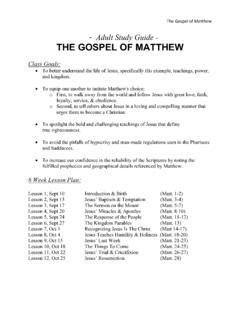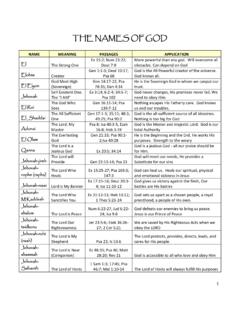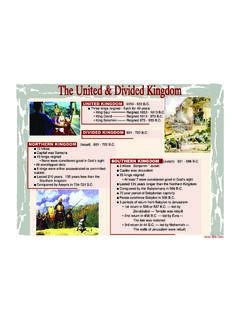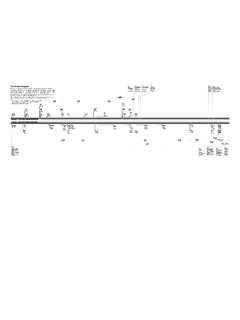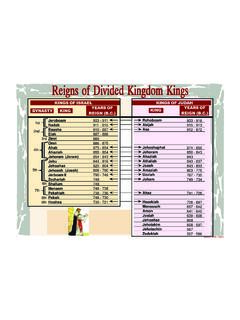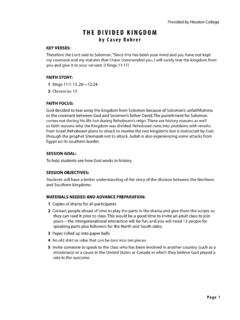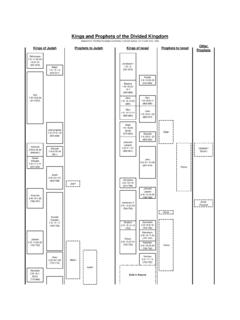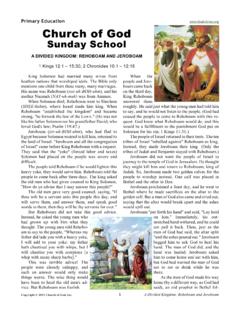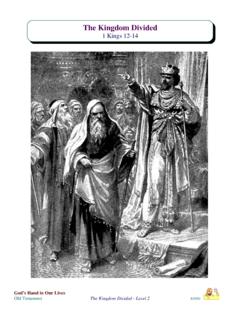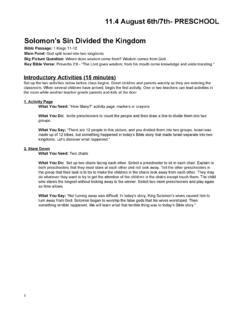Transcription of The Divided Kingdom, Prophets, & Return - Embry Hills
1 The Divided kingdom , Prophets, & Return To understand and avoid the sins that led to the division of the nation of Israel. To gain an overview of the history, kings, and prophets of Israel and Judah. To rejoice in God s faithfulness to protect and restore His people. Key Text Date The kingdom Divides 1 Kings 11-14 Sunday, February 26 The Traits of Judah & Israel 1 Kings 15-16, 21 Wednesday, March 1 The Work of Elijah & Elisha 1 Kings 17-22, 2 Kings 1-7 Sunday, March 5 The Fall of Israel 2 Kings 8-17 Wednesday, March 8 The Fall of Judah 2 Kings 18-25 Sunday, March 12 The Prophets Select Readings Wednesday, March 15 The Coming kingdom Daniel Sunday, March 19 The Prophets Select Readings Sunday, March 26 Rebuilding The Temple Ezra Wednesday, March 29 Rebuilding Jerusalem Nehemiah Sunday, April 2 Protecting God s People Esther Wednesday, April 5 Messianic Prophecies Isaiah 53 Sunday, April 9 Review Wednesday, April 12 Wednesday, April 12 Lesson One 1 Kings 11-14 The history of God s people in the Old Testament is found in 5 Sets of books: 1 & 2 Samuel: The Formation of the kingdom of Israel 1 & 2 Kings.
2 The Explanation of The Division 1 & 2 Chronicles: The Salvation of the Remnant Ezra, Nehemiah, & Esther: The Captivity & Restoration Isaiah Malachi: God s Prophetic Message to His People This section of Bible History teaches an unforgettable lesson: Disobeying God Leads To Slavery! In these books we read of the sad downfall of Israel in slavery to Assyria, and Judah in slavery to Babylon. These events demonstrate the spiritual reality that when we disobey God, we become a slave to SIN! 1.) According to 1 Kings 11:28-39 a. Who was Jeroboam? b. Why were the twelve tribes in the kingdom of Israel Divided ? c. How many tribes would make up the Northern kingdom ? d. How many tribes would make up the Southern kingdom ? 2.) Rehoboam and Jeroboam both fail to follow God. a. Describe the bad choices Rehoboam makes: (1 Kings 12:4-15) b. Describe the bad choices Jeroboam makes: (1 Kings 12:25-29) 3.
3 Jeroboam broke many of God s commands about HOW to offer worship. What evil changes do you see in 1 Kings 12:30-33 and 1 Kings 13:33-34? Lesson Two 1 Kings 15-16, 21 Over time, 19 different kings ruled in the northern kingdom of Israel, and every one of them did evil in the sight of the Lord. In the southern kingdom of Judah there were 20 kings, and sadly the majority of these kings were also evil. The only righteous kings in Judah were: Asa (1 Kings 15:11-14) Jehosophat (1 Kings 22:42-43) *Joash fell from good to bad. Uzziah or Azariah (2 Chronicles 26:3-4) *Amaziah fell from good to bad. Jotham (2 Kings 15:32-34) Hezekiah (2 Kings 18:1-6) Josiah (2 Kings 22:1-2) In this lesson we will read about the good king, Asa, in Judah as well as the evil king, Ahab, in Israel. Both of these kings are a good example of the type of leaders who ruled during the Divided kingdom .
4 1.) According to 1 Kings 15:10, how many years did Asa reign over Judah? a. 2.) According to 1 Kings 15:11-14, a. What good reforms did Asa make? b. What evil practices did Asa fail to correct? 3.) According to 1 Kings 16:29-31, how great was the wickedness of king Ahab in Israel? 4.) In 1 Kings 21 what sinful attitudes and actions does Ahab demonstrate while pursuing Naboth s vineyard? 5.) Based on Ahab s example in 1 Kings 21:27-29, how should we act when told about our sin? Lesson Three 1 Kings 17-22, 2 Kings 1-7 While many kings rose and fell during the Divided kingdom , the prophets of God were a bright light of faith, courage, and truth. 1 & 2 Kings record the lives of the prophets Elijah and Elisha to teach us how to trust in God s power and serve God faithfully despite our surroundings. 1.) Elijah s life and work teach us to trust in the awesome POWER of God.
5 A. In 1 Kings 17:1-16 we learn that God has power over _____. b. In 1 Kings 18:17-40 we learn that God has power over _____. c. In 1 Kings 19:3,15-18 we learn that God has power over _____. d. In 1 Kings 20:13-21 we learn that God has power over _____. 2.) According to 1 Kings 18:25-29, what did the prophets of Baal do in hopes that their false god would answer their requests? 3.) According to 1 Kings 18:36-40 how did the LORD God answer Elijah? 4.) According to 2 Kings 2:1-14 how was Elijah taken into heaven? 5.) Elisha s life and work teach us to love and serve God with all our heart. a. In 2 Kings 3:3 what sins did Jehoram cling to? b. In 2 Kings 3:11-12 what was Elisha s reputation? c. In 2 Kings 4:1-7, what special blessing does Elisha offer to the widow? d. In 2 Kings 5:1-14, what command does Elisha give to Naaman to be made clean and whole? 6.) Based on the example of the Lepers in 2 Kings 7:1-16, when we have good news that will save others, what must we do?
6 Lesson Four 2 Kings 8-17 The last days of the nation of Israel were sad times. Israel s kings were evil and weak. Some only ruled for a single month! (2 Kings 15:13.) While Israel grew weaker, Assyria grew stronger. Tiglath-Pileser, the king of Assyria, came in 2 Kings 15:20 and demanded tribute money. Israel helplessly paid but was still attacked (vs 29). Then in 2 Kings 17:3 Shalmaneser, the king of Assyria, came and conquered the rest of the nation. Overview: Israel was taken into captivity by the A_____. Judah was taken into captivity by the B_____. The decree for the remnant to Return to Jerusalem was issued by C_____. The decree to finish building the temple in Jerusalem was issued by D_____. 1.) Jehu was called by God to destroy two groups of evil a. According to 2 Kings 9:1-10, the first group was:_____. b. According to 2 Kings 10:18-36, the second group was: _____.
7 2.) After Jehu, what important job did Jehoash accomplish? (2 Kings 12:1-16) 3.) Before he died, Elisha told Joash, the king of Israel, to strike the ground with his arrows. a. How many times did Joash strike the ground? (2 Kings 13:14-21) b. How many times did Joash defeat the king of Aram? (2 Kings 13:22-25) 4.) 2 Kings 15 lists the kings of Israel as they begin to lose their power to Assyria. a. 2 Kings 15:1 King of Israel Jeroboam II King of Judah _____ b. 2 Kings 15:8 King of Israel _____ King of Judah Azariah c. 2 Kings 15:13 King of Israel _____ King of Judah Uzziah d. 2 Kings 15:17 King of Israel _____ King of Judah Azariah 5.) 2 Kings 17 tells us why God allowed Assyria to defeat and destroy Israel. a. Israel had feared other _____. (vs 7) b. Israel had walked in the _____ of the nations (vs 8) c. Israel had burned incense on the _____ _____ (vs 11) d.
8 Israel had walked in the sins of _____ (vs 22) Lesson Five 2 Kings 18-25 Judah was not taken away into captivity by Assyria because they were more faithful to God than Israel. Good kings (such as Hezekiah and Josiah) believed in God and ruled with faith like their predecessor, David. However, the reforms of these good kings were not enough to keep the people loyal to the LORD. Eventually, even Judah became very wicked. Therefore, God sent the Babylonians to conquer the nation, deport the people, and destroy the temple. 1.) What made Hezekiah such a good king? (2 Kings 18:1-7) 2.) Sennacherib, king of Assyria, tried to discourage Judah from trusting in God by sending an army commander named Rabshakeh to threaten the people of Jerusalem. In 2 Kings 18:29-36, why does Rabshakeh say not to trust in the LORD? How do the people answer him? (vs 36) 3.) What prophet does God send to encourage Hezekiah to not lose faith in the Lord?
9 2 Kings 19:6 4.) God saved Hezekiah from Assyria and from a terrible illness. What was the sign of God s promise to extend Hezekiah s life? (2 Kings 20:5-11) 5.) According to 2 Kings 21:1-9 who became king after Hezekiah? a. Was this king good or evil? 6.) In 2 Kings 22 and 23 we read about the last good king of Judah. a. How old was Josiah when he became king? (vs 1) b. What job did Josiah give to Hilkiah? (vs 3-5) c. What great treasure did Hilkiah find? (vs 8-13) d. What did Josiah get rid of in 2 Kings 23:5, 7, 11, 15? 7.) When the people returned to their sins, who did God send to destroy Judah? (2 Kings 25:1-12) Lesson Six Prophets Related to Assyria For approximately two centuries, Assyria (often represented by Nineveh, its capital) was the major power in the Near East. It maintained a perpetual expansionist policy and was notably cruel in its conquests and control of subject people.
10 God used Assyria as His rod to punish His people for their sins (Is. 10:5). Six prophets delivered messages relating to Assyria. At the same time, four of them looked beyond their own times to the times of the Messiah. Read the texts to see the message they delivered. The prophet Sins of Israel Assyria Messiah Jonah (780 ) Destruction predicted Repentance Avoided it. Why would Jonah not want Nineveh spared? Amos (760 ) Injustice (2:6-8) Idolatry (3:14; 4:4) Self-indulgence (6:1-6) Captivity predicated without designating Assyrians (4:1-3) Amos 9:11-12, quoted in Acts 15:16-18 Hosea (750 ) Idolatry (symbolized by unfaithfulness of Hosea s wife (Chap. 1-2, 5:4, 8:4-6, 13:2) Assyrians will carry away the Israelites and their idols (Hos. 10:5-8) God would forgive and accept Gentiles as well. (Hosea 2:19-23) Micah 735 (a Judean) Dishonesty, deceit, idolatry, bribery, treachery (6:9 7:6) Captivity predicated without designating Assyrians (1:6-7) Birthplace (5:2) Establishment of His kingdom (4:1-5) Isaiah 740-686 ( prophet in Judah) Sins of Judah Formalism without morality (Is 1:2-15) Assyrian Army destroyed by the faith of King Hezekiah (Isaiah 36-37) Assyria recovered Birth (7:14; 9:6-7) kingdom (11:1-10) Death, Resurrection.)
